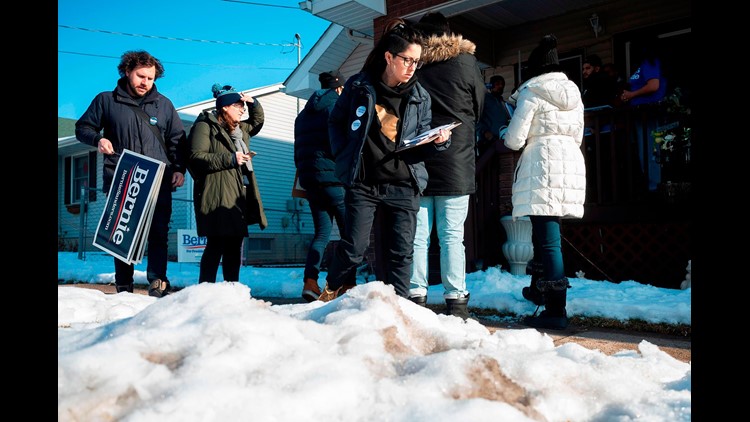(CNN) — An embarrassing vote-reporting snafu in the first-in-the-nation Iowa Democratic caucuses caused by “inconsistencies” in different data sets is frustrating candidates and holding up results in the opening clash of the campaign to find a candidate to take on President Donald Trump.
More than three hours after the caucuses started with Sen. Bernie Sanders, Sen. Elizabeth Warren, former South Bend, Indiana, Mayor Pete Buttigieg and former Vice President Joe Biden vying for first place, the first results of 1,600 precincts have yet to emerge.
The delay seems to have been caused by the state party’s new system, which is counting the popular vote from a first round of voting, an updated tally once caucusgoers give their final verdicts and the figures for pledged delegates each candidate eventually wins.
“We found inconsistencies in the reporting of three sets of results. In addition to the tech systems being used to tabulate results,” said Iowa Democratic Party Communications Director Mandy McClure in a statement.
“We are also using photos of results and a paper trail to validate that all results match and ensure that we have confidence and accuracy in the numbers we report. This is simply a reporting issue, the app did not go down and this is not a hack or an intrusion. The underlying data and paper trail is sound and will simply take time to further report the results.”
The logjam threatens to rob the eventual winner of the caucuses of some of the early bounce from their victory and is a poor look for a party trying to prove it is up to taking on Trump’s fearsome political machine. It might offer candidates who do more wore than expected some cover and is already raising questions about Iowa’s place at the front of the presidential calendar.
The campaigns are frustrated.
“It’s clear that something has gone wrong,” a representative from one of the campaigns told CNN’s Jeff Zeleny.
Officials from two Democratic campaigns tell CNN they were told the app to tabulate results had crashed — despite what the state party reported.
A state Democratic official who was in the party’s war room a short time ago said the mood was calm and the officials were committed to doing what was necessary to get the results correct, which contain more details this year than in previous caucuses.
“More data takes more time,” the official said.
One candidate, Minnesota Sen. Amy Klobuchar made a shrewd move to fill the political vacuum and gave a pseudo-victory speech — grabbing the television spotlight in the absence of results giving other more favored candidates the win.
“We know there are delays, but we know one thing — we are punching above our weight!” Klobuchar said.
As the mystery of the delayed results lingered, a Democratic aide attending an event at Klobuchar’s Iowa headquarters told CNN’s Jasmine Wright that “something is up, but we don’t know what it is.” The aide said they have been pinging the Iowa Democratic Party, asking for answers.
Earlier, CNN entrance polls showed that Sanders, Biden, Buttigieg and Warren were the early leaders among 11 candidates. Since voters can change their preferences inside the caucuses if their favorite candidates do not reach a minimum threshold, this data is preliminary and will likely change.
In the absence of official results, campaign managers were reading the tea leaves from information sent in by field staff to try to assess how they were performing. Two senior aides to the Buttigieg campaign, for instance, said that they were performing more strongly than expected, according to their internal tallies.
“Things look pretty good so far,” one aide said.
Other campaigns were also contacting organizers in rural areas to try to get an early picture of how their candidates fared and how their efforts during months of campaigning are paying off.
A crucial first night
The first night of presidential balloting since Trump’s shock White House triumph in November 2016 could spring its own surprises and is seen as too close to predict, especially given the size of the field.
In a quirky exercise of in-person democracy, caucusgoers in more than 1,600 precincts are gathering in groups to show support for their favored candidates at the beginning of the caucuses, which could last a couple of hours.
Supporters of White House hopefuls who don’t meet a threshold of 15% in any given precinct have the chance to recommit to “viable” candidates or go home — and are facing a hard sell by pleading friends, neighbors and business contacts backing other candidates to join them before officials create final tallies.
Delegates are awarded proportionally and Iowa accounts for 41 of the 1,991 pledged delegates needed to capture the nomination at the Democratic National Convention in Milwaukee in July.
Turnout will be closely watched on Monday night for clues about the morale of Democratic voters ahead of what is likely to be a fierce battle with Trump. The record to beat is the 240,000 caucusgoers who showed up in 2008, when Barack Obama made a huge first step toward the party nomination.
Iowa’s notoriously frigid weather was kind on Monday and appeared to boost attendance. Temperatures were hovering around freezing in Des Moines when the caucuses opened.
Republicans are also hosting caucuses on Monday night in Iowa. There is little real competition — CNN is projecting Trump will win the state.
Huge night for candidates
The Iowa race took center stage after being largely overshadowed by the raucous Trump presidency, and the impeachment drama that is just wrapping up in Washington and kept the senators running for the Democratic nod off the trail at the climax of the Hawkeye State campaign.
It will test whether Trump’s attacks on Biden have harmed perceptions of his electability among Democratic voters. The impeachment drama embroiled the former vice president since Trump leaned on Ukraine to dig up dirt on a rival who has long been seen as the national Democratic front-runner. The former Delaware senator has long styled himself, after a near half century in top level politics, as the best positioned Democrat to beat Trump — and to restore what he says is the nation’s fractured values and equilibrium.
His former Senate colleague Sanders rushed back to the Hawkeye State on Monday night after attending closing arguments in the Trump impeachment trial in the Senate earlier in the day. After narrowly losing the caucuses in a near dead heat to Hillary Clinton four years ago, the Vermonter is banking on his fired-up supporters to push him over the line.
And many Iowa veterans believe Warren built the best organizing network in the state, which could help her recapture momentum that faded after a spurt over the summer. The Massachusetts senator has positioned herself between Sanders and the moderate crop of candidates, promising an overhaul of an economy that she says is weighted toward the wealthy.
Meanwhile Buttigieg, a veteran of the Navy Reserve who deployed to Afghanistan, is presenting himself as the pragmatic alternative to Biden and subtly arguing that the former vice president’s time has come and gone.
One candidate who may not survive a disappointing performance in Iowa is Klobuchar, who has tried to parlay folksy Midwestern moderation into a spot in the top tier of the Democratic nominating race.
Other candidates taking a first run in the national presidential spotlight include entrepreneur Andrew Yang, who has wooed many young voters, and businessman Tom Steyer, who has spent tens of millions of dollars of his own cash to try to force himself into the race to take on Trump.
Former New York City Mayor Mike Bloomberg, who has splashed $300 million on his own run, is sitting out the first four races and hoping for an opening further down the road.
This is a breaking story and will be updated.



